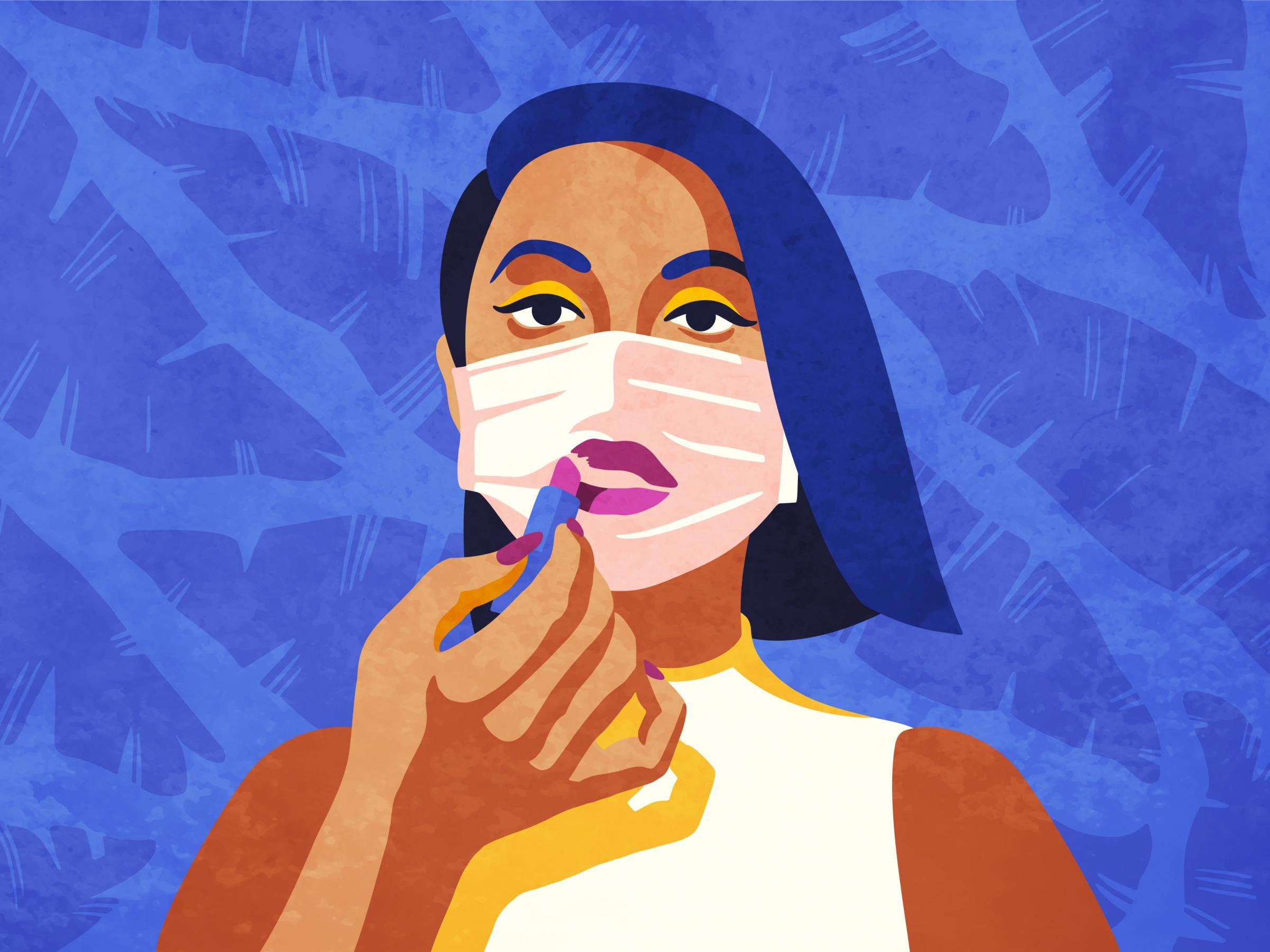How Muslim women are using makeup to get closer to their religion
For Muslim women who cover their hair, make up is a way of not only expressing themselves, but is also intertwined with their feelings about Islam, writes Saman Javed


Islam allows worshippers five small windows of time every day to escape the commotion of their lives through prayer. It’s a calming, three-step process. First, Muslims are required to perform Wudu, a ritual of cleansing the body. Then, they state their intention before praying.
For Salwa Rahman, a 25-year-old makeup artist from east London, the sense of control this routine brings is a lot like that when she sits down to create a makeup look. “It’s a lot of the same in that you cleanse your face, you sit down with an intention of doing a look, and then you begin. It really calms me and I find I usually enjoy the routine of it,” she says.
The comfort that makeup now brings Rahman is a far cry from her teenage years. “Growing up, I was that young, angsty hijabi that was always trying to be different.” Raised in the capital, she says it was an environment where Muslim women were seen as demure and oppressed.
“For me, the natural reaction to that was to excessively amplify who I was, or who I thought I was. Makeup was the perfect medium for me to do that. It was like I was saying to the world: I’m here, look at me,” she says. While her earliest makeup looks consisted of thick, clumpy mascara and kohl bought from the local shops, she soon started to experiment with colour.
One quick glance at her Instagram is confirmation that she has evolved her look. No longer does Rahman do makeup in a conventional way, or follow the latest beauty trends. Instead, her looks range from intricately crafted sheep on her eyelids, to an electric red crab painted in perfect symmetry across her cheeks.
Although Rahman started using makeup to challenge a stereotype, as her relationship with Islam has grown, her outlook has changed. “Islam says love yourself as you are, because you are God’s creation,” Rahman says. “When you get closer to Islam it becomes a case of ‘I love myself as God made me but I choose, because it is my choice, to wear makeup’.
Wearing the hijab made me concentrate a lot more on my makeup and my facial features, because my hair was covered...
“I no longer want the world to view me in a certain way, because I couldn’t care less about who it assumes I am,” she adds. “My makeup is first and foremost for myself.”
Rahman is not alone. Salma Begum, a beauty blogger who shocked her 20,000 Instagram followers last November when she started wearing the hijab, found that her relationship with, and love of, makeup also changed once she grew closer to her religion.
“Wearing the hijab made me concentrate a lot more on my makeup and my facial features, because my hair was covered,” she says. “It was quite exciting because it allowed me to really zone in on areas of my face that I hadn’t before, such as whether this eyebrow shape suits me or not,” she says.
This is something these women hope more people will begin to experience as Covid-19 requires people to wear face coverings in day-to-day life. In fact Mintel, a global market insight company, has already predicted that “the beauty industry can expect micro-categories of colour cosmetics such as eyeshadow, eyeliners, mascara, and concealers to gradually rise due to Covid-19”.
Mamoii Ali, a US-based photographer who wears the niqab, agrees that since she started wearing the face covering six years ago, she tends to apply more makeup to the eyes, and will always wear eyeliner and concealer.
While the beauty industry can be difficult to navigate for anyone because of the constant cycle of trends resulting in constant pressure to look better – more flawless and more kept – many Muslim women find their relationship with makeup is fraught with conflict.
In the Quran, Allah tells men to lower their gaze before he tells women to cover up...
One aspect of this, is that principally, the act of wearing the hijab or niqab is to cover the hair and face from men. Naima Mohamed, a makeup artist and content creator, says the criticism she gets for her bold eye-makeup looks while wearing a hijab often makes her second-guess the content she puts out on her Instagram. “People will tell me that my makeup looks are getting too much attention, and that in Islam this isn’t allowed,” she says.
Mohamed is not alone. Ali says she gets the same kind of messages every time she posts a picture. “People will message me on Instagram to say: ‘I don’t really think you should wear makeup like that; I think it’s immodest because you’re going to attract men.’”
Ali says this is a misconception: “In the Quran, Allah tells men to lower their gaze before he tells women to cover up. This is why, when I get these kinds of messages, I think to myself – I’m covered from head to toe. If they are attracted to me, that’s not my fault.”
Rahman says this definition of modesty, that Muslim women must not draw attention to themselves, is steeped in patriarchy. “Regardless of being a Muslim woman who wears makeup, you can still depict an air of modesty,” she says.
Ali adds: “If you look at Islamic history, modesty begins with character. It’s about how you interact with and treat others. But people tend to forget that. “The niqab is just a cloth on my face; it doesn’t measure how modest or pious I am.”
While the criticisms and prejudgements of Muslim women who are bold in their love of makeup are multi-faceted, influencers are either finding ways to actively challenge these or use their relationship with God to find acceptance within themselves. As Ali puts it: “Islam itself gives a woman all the confidence she needs to enjoy her self.”
Join our commenting forum
Join thought-provoking conversations, follow other Independent readers and see their replies
Comments
Bookmark popover
Removed from bookmarks